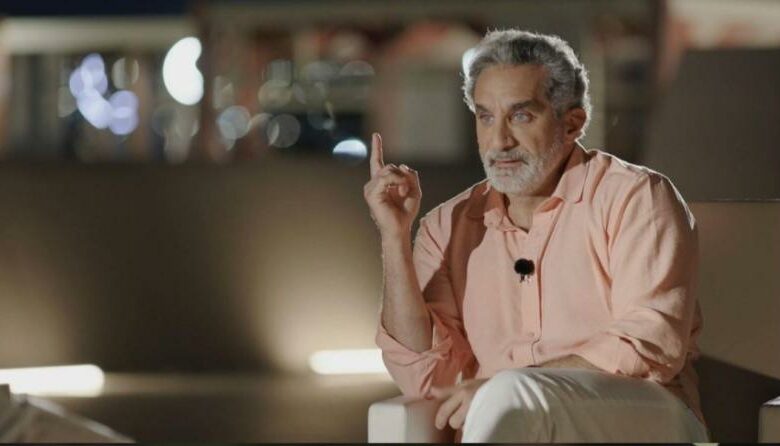
On October 7, Tuesday evening, Egyptian and Arab audiences will witness Bassem Youssef on the ON channel in an interview conducted by Ahmed Salem, presented as a segment within his talk show “Kalima Akheera” (The Last Word).
Youssef has achieved unprecedented popularity both inside and outside Egypt.
However, about ten years ago, restrictions were tightened on him, and he found himself forced to cross to the other side of the Atlantic Ocean to continue his journey in the US.
Youssef’s programs were categorized as “adults only.” Egyptian channels eagerly issued warnings that his content was for audiences over 16, as he occasionally used language could conflict with the typical nature of the television audience, which was accustomed to safer phrasing.
A prior warning was therefore necessary.
There are names within the media sphere that represent a very special case. When such an individual employs a team of assistants, you find them even adopting his specific vocabulary.
Youssef has an actor within him who excels at delivering lines with a measured margin of expressive performance in both voice and movement. He chooses the idea, the sequence, and the style.
Audiences always anticipate a signature expression—the kind of breaking the mold or off-script comment commonly associated with him.
Two years ago, when he decided to defend the right for the people of Gaza to live and to counter misleading narratives, the conversation was conducted in English. He was then compelled to use a highly informal, colloquial Egyptian expression, primarily recognized by people from Alexandria – one which elicited a mix of astonishment and revulsion from listeners.
The global press immediately seized on the word and began analyzing it, and millions followed the story—much like when the Minister of Information during Saddam’s final era, Al-Sahhaf, used the word “alouj” (infidels/heathens).
Similarly, when Gamal Abdel Nasser described British Prime Minister Anthony Eden during the 1956 war as “al-khara’” (the coward/the idiot), it also became a global talking point.
These words, deeply rooted in their local context, consistently trigger mountains of questions.
Choosing to use a word that creates a huge stir and shock is a very special talent. I believe that in all the aforementioned cases, this choice was spontaneous, which is why it spreads across all languages of the world.
This is one of Bassem’s key weapons in reaching his audience.
Deviating from the accepted public line relies on the state’s broad scope and flexibility. Naturally, there is an agreement on the broad lines that Bassem will adhere to. The other side of the coin is that there are red lines that Youssef will not approach.
The interview will be broadcast live via satellite from the US, which lends the meeting greater credibility and completely negates the possibility of any editing or cutting.
There is a high ceiling of expectation. For those—and there are many—who hold Bassem’s previous work in memory, it will be difficult for them to be satisfied with anything less.
The choice of an interview format means that Ahmed Salem will select the questions, and he is aware that no matter how much Youssef deviates in his answer, he will not break through the agreed-upon ceiling.
However, the choice of a specific word, a suggestion, a whisper, and pauses all remain weapons in Bassem’s hands.
I view the situation as akin to a match on a board similar to a ping-pong table, where both Bassem and Salem will be careful to ensure the ball stays within the table’s limits.
Some are betting that Youssef will adhere strictly to the instructions, perhaps even over-comply with them.
I believe that is a flawed reading.
He knows that his value in the media—whether as a host or a guest—is directly equivalent to his credibility. If he compromises, even slightly, for the sake of accommodation, he will leave as a loser, jeopardizing not only his present and future but also his past.
Viewers will feel regret, sensing they had bet on an interviewer who was merely acting a part.
What I can confidently write is that the state is very serious about opening doors and discussing all issues, and Bassem’s return is one practical example of this shift.
What remains outside that equation is the gap between reality and expectation. The question is: will Bassem Youssef cross it?




